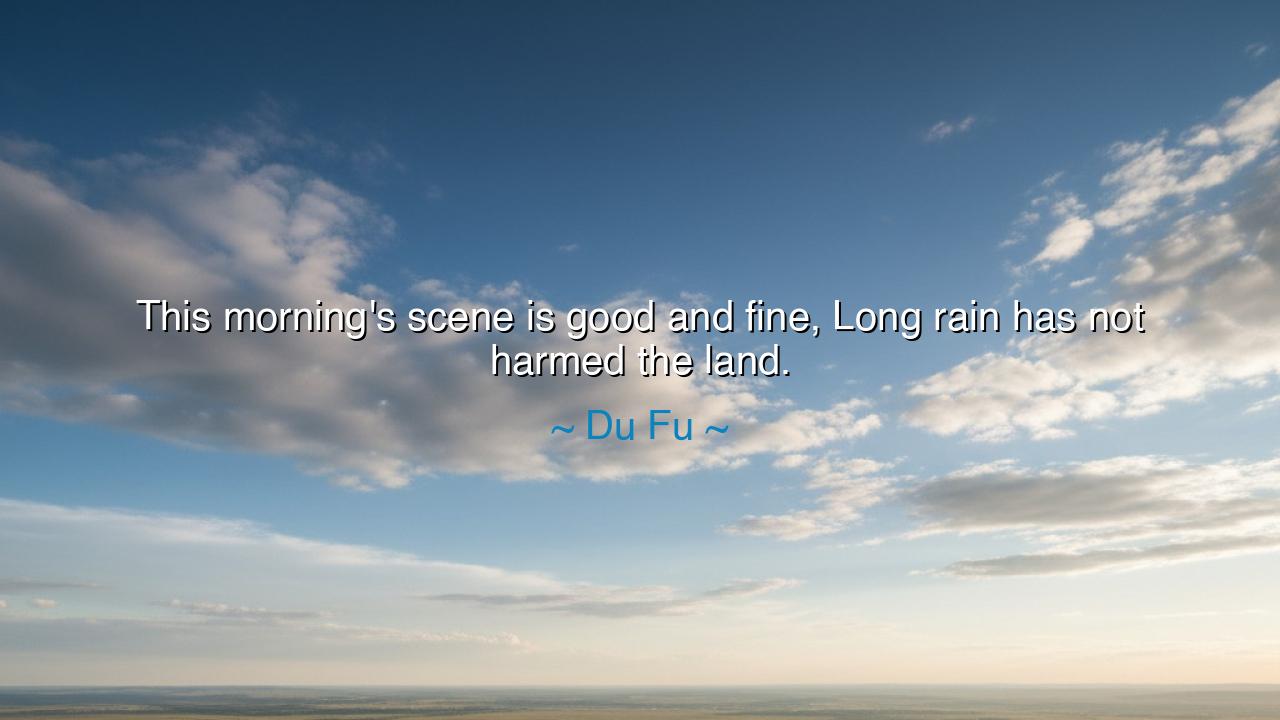
This morning's scene is good and fine, Long rain has not harmed






“This morning’s scene is good and fine, Long rain has not harmed the land.” Thus wrote Du Fu, the sage-poet of the Tang dynasty, whose words, though simple in form, bear the weight of centuries of human endurance. In these lines we hear the voice of a man who had seen suffering, famine, and war, yet still found solace in the gentle resilience of the earth. For the rain, long and heavy, is a symbol of trial and hardship; yet when the clouds part and the morning arrives, he sees that the land endures, the fields still stand, and beauty remains. What is this but a lesson for the soul—that hardship does not always destroy, but sometimes nourishes?
The origin of this saying lies in Du Fu’s life, one marked by turbulence. Living during a time of rebellion and disarray in China, he wandered often in poverty, plagued by illness and war. Yet amidst this chaos, he looked upon the world not only with sorrow but also with gratitude. He observed the patience of nature: though the rains fell without ceasing, though storms lashed the earth, the land absorbed the burden and was not destroyed. Thus, his poem becomes more than observation; it becomes wisdom—that what seems a trial may in time be revealed as a blessing.
The ancients often drew strength from the natural world, seeing in its rhythms a mirror of human life. The Stoics taught that storms, though fierce, cleanse the air; that adversity, though bitter, purifies the spirit. The Hebrew psalmist declared, “Weeping may endure for the night, but joy comes in the morning.” Du Fu joins this chorus of timeless voices, proclaiming that long rains, though wearisome, prepare the land for growth. Suffering, endured with patience, may yield renewal.
History offers us many such examples. After the Great Fire of London in 1666, when the city lay in smoldering ruins, many feared the end of its glory. Yet in the ashes was born the chance to rebuild stronger, with wider streets, sturdier buildings, and grander visions. The long “rain” of destruction did not ruin the land—it prepared it for renewal. So too in Japan, after the devastation of Hiroshima and Nagasaki, the people endured unimaginable suffering, yet from that sorrow arose a nation that rebuilt with discipline and strength, becoming a place of peace and innovation. The rain did not destroy—it transformed.
From this we learn that despair in the midst of hardship is a temptation, but not the truth. When trials come, they often appear endless, like the long rain that seems it will never cease. Yet the morning always follows, and what we feared would be broken may yet endure. The land survives, and so do we. What matters is not only the endurance of the storm, but the wisdom to see beyond it, to trust that growth may follow.
Practical wisdom follows: when you face hardship, remember Du Fu’s words. Look not only at the storm, but at the morning that will come after it. Train your heart to see not only the destruction but the renewal that lies hidden within trial. When the “rain” of life falls—failure, loss, grief—stand firm. Ask not only, “Why must this happen?” but also, “What will grow from this?” For patience transforms suffering into strength, and endurance transforms sorrow into wisdom.
Thus, let us carry Du Fu’s vision within us: “This morning’s scene is good and fine, Long rain has not harmed the land.” May it remind us that trials are not always ruin but preparation, that the earth—and the human spirit—possesses resilience beyond measure. The morning always comes, and when it does, it reveals not only survival but beauty. And those who learn to see this truth will rise from every storm with deeper roots, stronger hearts, and eyes that behold the goodness of life even after the longest rain.






AAdministratorAdministrator
Welcome, honored guests. Please leave a comment, we will respond soon